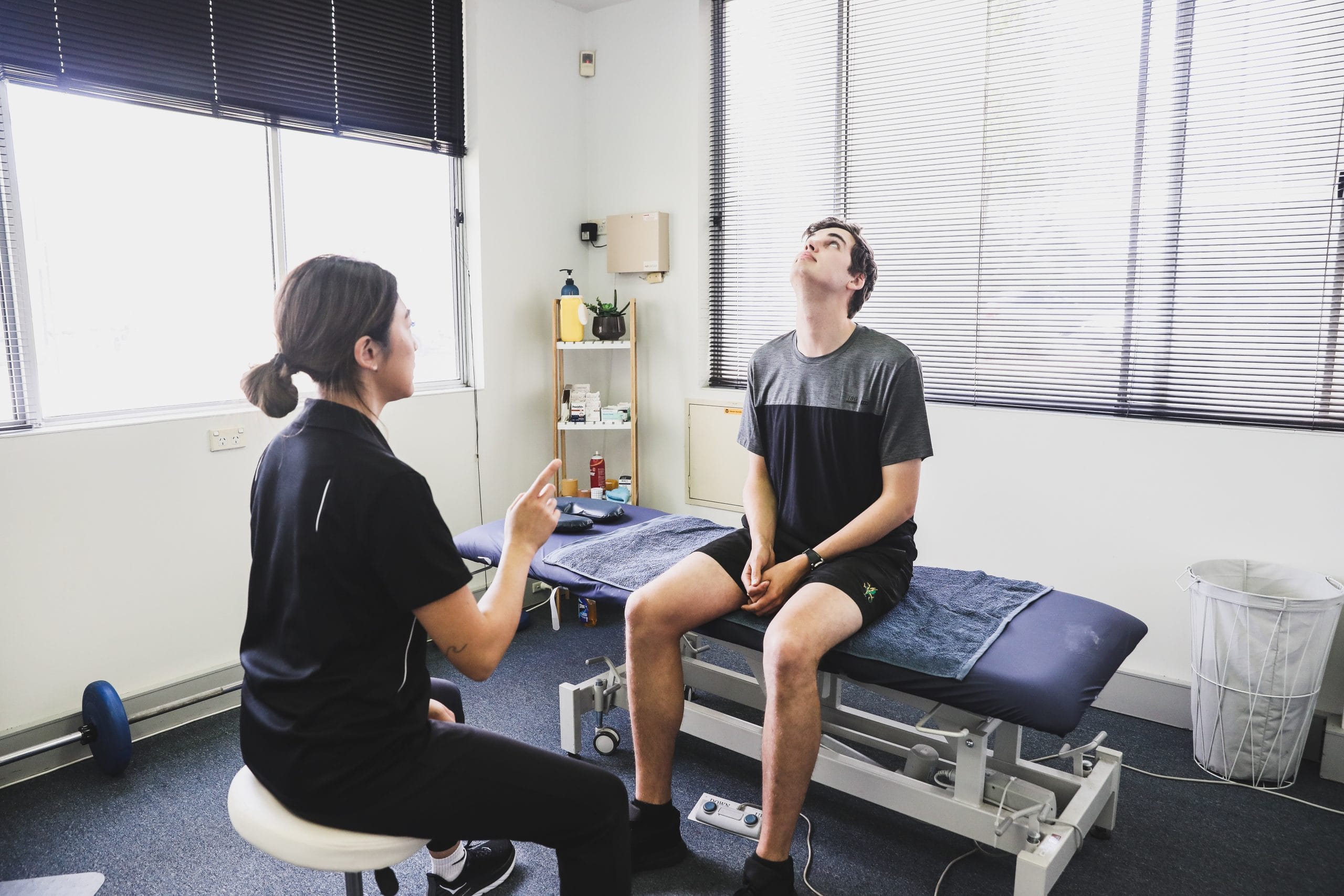
We’ve spoken a lot about vertigo in our blogs – and that’s because it can truly be debilitating in your day-to-day life. If you suffer from vertigo, you’ll know how important it is to seek advice from a healthcare professional to ensure you’re addressing the root cause.
But did you know that beyond medical treatment, certain dietary choices can have a big impact on the frequency and severity of vertigo episodes? If you experience vertigo, there are some foods to avoid and foods to prioritise to help ease symptoms. Here’s how to establish the best diet for vertigo.
Understanding the vertigo + diet equation
Vertigo is a sensation of spinning or moving, often caused by underlying health issues. It can lead to balance problems, nausea, and difficulty walking.
Many things can trigger vertigo, but dietary choices can often play a crucial role. For example, diets high in sodium can exacerbate certain conditions like Meniere’s disease, which is associated with severe vertigo episodes. Dehydration and low levels of certain nutrients, like B12 and magnesium, can also contribute to vertigo.
Adjusting some of your dietary habits can mean a potential reduction in the frequency and intensity of your symptoms – so these tips are definitely worth a shot!
Hydration
Staying hydrated is crucial, not just for preventing vertigo, but for your general health and well-being. Dehydration can lead to decreased blood volume, lowering blood flow to the brain and potentially triggering dizziness and balance issues.
You know the drill: aim to drink at least two litres of water every day and remember, fruits and veggies like cucumbers and watermelon also contribute to hydration – a win-win!
Get your key nutrients
With vertigo, certain nutrients are particularly important for managing symptoms.
- Vitamin D: Those experiencing frequent vertigo are often lacking in Vitamin D! It’s key for maintaining your bone health and has also been linked to a healthy inner ear balance.
- Magnesium: This mineral does a lot for us! It helps regulate nerve function and blood pressure, which can affect your balance, so it’s important to keep up your magnesium intake if you’re noticing more frequent bouts of vertigo.
- Vitamin B12: A deficiency in B12 can lead to neurological issues, and that includes vertigo.
Wondering what the difference is between vertigo and dizziness? Read here to find out!
Foods to reduce vertigo symptoms
Lean proteins
Proteins are essential for muscle strength and repair, and they also help stabilise blood sugar levels – very important for maintaining balance!
Lean sources of protein like chicken, turkey, fish, and legumes (like lentils and chickpeas) not only provide energy but are also low in fat, supporting your overall health without overburdening your digestive system.
Whole grains
Whole grains are a vital source of B vitamins and essential minerals that contribute to the proper functioning of your nervous system.
Foods like quinoa, brown rice, whole wheat pasta, and oats offer sustained energy released, which is crucial for preventing blood sugar spikes and dips that might trigger vertigo symptoms. Plus, these grains provide the benefit of dietary fibre, which helps maintain your digestive health and satiates for longer.
Fruit and vegetables
Rich in vitamins, minerals, antioxidants, and fibre, fruits and veggies are the cornerstone of a vertigo-friendly diet.
Dark leafy greens like spinach and kale are high in magnesium and vitamin B, both of which play a big role in controlling dizziness. Brightly coloured fruits like berries, oranges, and apples are packed full of antioxidants that protect your body’s cells from damage.
Make sure to include a variety of different fruits and veggies to ensure you get a broad range of nutrients.
Foods to avoid
Salty foods
Watching your salt intake is crucial if you suffer from frequent vertigo episodes! Consuming high levels of sodium can affect the fluid balance in your inner ears, leading to increased pressure which can worsen vertigo symptoms.
If you have Meniere’s disease, this is particularly relevant, as the ear fluid buildup experienced links directly to vertigo episodes.
To reduce sodium intake, avoid adding extra salt to meals and be careful with processed foods, canned soups, and salty snacks like chips and pretzels, which all typically have high salt levels.
Caffeine and alcohol
Bad news for coffee and tea lovers – they can lead to vertigo symptoms. Both caffeine and alcohol can influence blood flow to the brain and inner ear. Caffeine can be found in more than just coffee and tea, too; it’s present in some chocolate, soft drinks, and energy drinks, all contributing to the constriction of blood vessels and the rising of blood pressure. This can destabilise your inner ear fluids.
Alcohol, on the other hand, can both dehydrate and change the volume and composition of the fluid in your inner ear… double the fun!
Sugary foods
Foods high in sugar can cause fluctuations in blood sugar levels which, as we know, can impact your sense of balance. Rapid increases and decreases in blood glucose can lead to episodes of dizziness.
Foods like lollies, cakes, chocolate, soft drinks, and other sweet treats can be particularly harmful if consumed in large quantities. But you also need to watch out for hidden sugars, like those in fruit juices or salad dressings. Opt for natural sugars found in fruits instead!
Stuck? Try out this sample meal plan for vertigo
Creating a daily meal plan that incorporates vertigo-friendly foods and triggers plays a key role in preventing vertigo attacks. Here’s a sample meal designed to provide balanced nutrition and steady energy throughout the day.
Please note: This is just an example and should not be considered professional nutrition advice. Make sure you chat with your doctor or dietitian/nutritionist before making any big changes to your diet!
Breakfast
Start with something like a smoothie made from Greek yoghurt, fresh berries, a handful of spinach, and a small banana. Add a liquid to make it a better consistency; coconut water is a great option! This meal provides protein, antioxidants, and a great dose of magnesium and potassium, all beneficial for neurological health.
Lunch
Try a salad with mixed greens (including spinach and rocket), cherry tomatoes, sliced cucumber, grilled chicken breast, and a sprinkle of almonds. Dress it with olive oil and lemon juice. If you’re not a fan of chicken, you can look at incorporating some healthy fatty fish like salmon or tuna, or if you’re vegetarian, chickpeas are also a great option!
Dinner
Try a piece of baked salmon seasoned with herbs (like dill and parsley) and serve it up with quinoa and broccoli. This provides omega-3 fatty acids, protein, and fibre, all great for vertigo. Plus, you can easily cook your salmon and veggies in the air fryer.
Snacks
Don’t be afraid of snacking. Incorporate small handfuls of mixed nuts or carrot sticks with hummus to keep your energy levels stable, without the heavy sugars or salts.
Read more about how to treat vertigo at home.
Tackle your vertigo from all sides
Diet is just one piece of the puzzle. For personalised guidance and to ensure you’re addressing the root cause of your vertigo effectively, look into vestibular physiotherapy with our experienced Integrity Physio team. We can help you get back on your feet, without the fear of dizziness holding you back.




